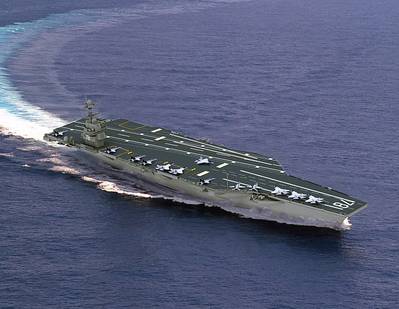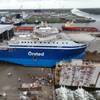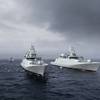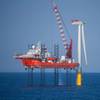GAO Critical of Navy Flat-top Program
In a new report, the US Government Accountability Office (GAO) states that the Navy faces technical, design, and construction challenges to completing 'Gerald R. Ford' (CVN 78) that have led to significant cost increases and reduced the likelihood that a fully functional ship will be delivered on time. The GAO finds:
The Navy has achieved mixed progress to date developing CVN 78's critical technologies, such as a system intended to more effectively launch aircraft from the ship. In an effort to meet required installation dates aboard CVN 78, the Navy has elected to produce some of these systems prior to demonstrating their maturity--a strategy that GAO's previous work has shown introduces risk of late and costly design changes and rework, and leaves little margin to incorporate additional weight growth in the ship.
In addition, progress in constructing CVN 78 has been overshadowed by inefficient out-of-sequence work, driven largely by material shortfalls, engineering challenges, and delays developing and installing critical technology systems. These events are occurring in a constrained budget environment, even as lead ship costs have increased by over 22 percent since construction authorization in fiscal year 2008--to $12.8 billion. Additional increases could follow due to uncertainties facing critical technology systems and shipbuilder underperformance.
The Navy's strategy for providing timely demonstration of CVN 78 capabilities is hampered by post-delivery test plan deficiencies, Joint Strike Fighter aircraft delays, and reliability shortfalls affecting key ship systems. Additional risk is introduced due to the Navy's plan to conduct integration testing of key systems with the ship at the same time as initial operational test and evaluation (IOT&E). This strategy will constrain opportunities to implement timely, corrective actions if problems are discovered with key ship systems. In addition, significant discoveries during IOT&E could delay demonstration of ship capabilities. The Joint Strike Fighter, intended to operate with the carrier, has faced delays, and there is the likelihood of costly retrofits to the ship to accommodate the aircraft after CVN 78 is delivered to the Navy. But even after the ship commissions, several key ship systems will continue to face significant reliability shortfalls that will likely increase costs to the government and limit the ship's mission effectiveness. The extent of these limitations will not be known until after IOT&E. GAO contemplated making a recommendation to delay CVN 78 commissioning until the ship successfully completes IOT&E. However, based on additional information provided by DOD, GAO decided not to include this recommendation in the report.
Why GAO Did This Study
The Navy plans to spend over $43 billion to produce three Ford-class aircraft carriers. The lead ship, CVN 78, is under construction, and preparation work is underway for the second, CVN 79. These ships will feature new technologies designed to increase capability and reduce crew size. GAO was asked to evaluate the progress of the Ford class. This report examines (1) technical, design, and construction challenges to delivering the lead ship within budget and schedule estimates; (2) the Navy's test strategy for demonstrating CVN 78's required capabilities; and (3) actions the Navy is taking to improve CVN 79 cost outcomes. GAO analyzed documents related to mission requirements, acquisition plans and performance, and testing strategies, and interviewed Department of Defense (DOD) and contractor officials.
What GAO Recommends
GAO recommends the Secretary of Defense take several actions aimed at ensuring Ford-class carrier acquisitions are supported by sound requirements and a comprehensive testing strategy, including conducting a cost-benefit analysis of required capabilities and associated costs. GAO is also recommending actions to improve the Navy’s knowledge about CVN 79 capabilities and costs before beginning contract negotiations. DOD concurred with one recommendation, partially concurred with three others, and did not concur with the recommendation to defer CVN 79’s detail design and construction contract award. GAO maintains that DOD’s current schedule for awarding this contract undermines the government’s negotiating position.












